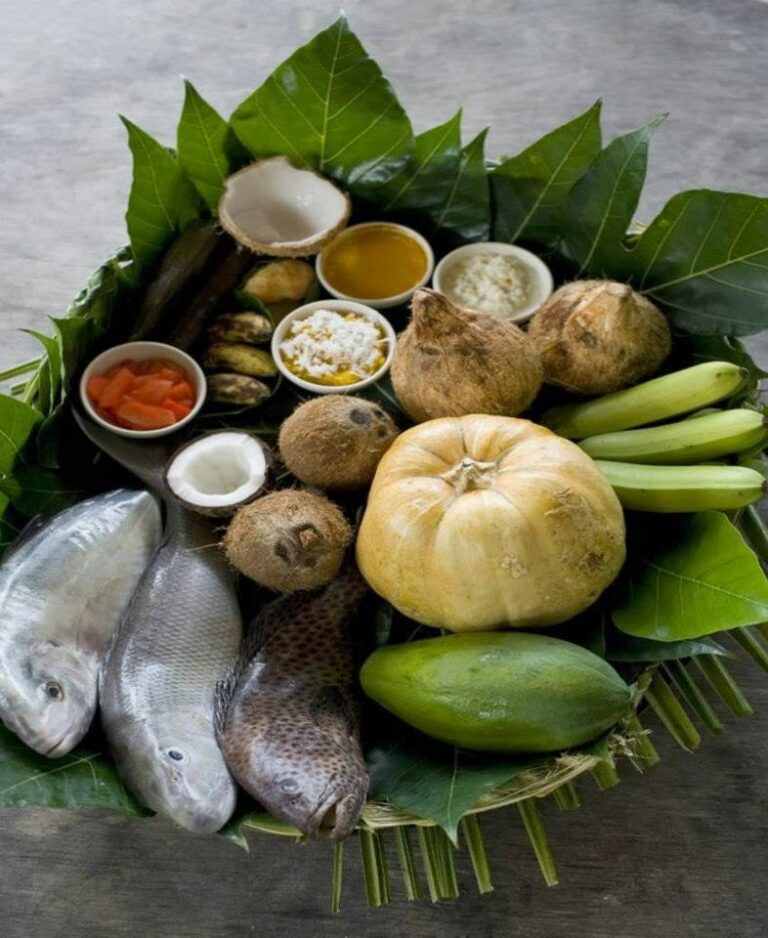Introduction: Understanding the Marshall Islands’ Culture and Religion
The Marshall Islands is a Pacific island country that is made up of 29 atolls and 5 islands located between Hawaii and Australia. The Marshallese people are known for their unique culture that is deeply rooted in their history and beliefs. The country has a complex history of colonization and missionary influence, which has influenced its culture and religion over time.
The Marshallese people have a diverse range of religious beliefs, but the majority of the population follows Christianity. The country is home to several Christian denominations, such as the Roman Catholic Church, Protestantism, and Seventh-Day Adventism. However, there are also some who still practice their traditional beliefs, which include ancestor worship and the belief in supernatural beings.
Marshallese Cuisine: Food Staples and Common Dishes
Marshallese cuisine is primarily centered around seafood, coconut, and root vegetables. The most common dishes include fish, octopus, breadfruit, taro, and coconut milk. One of the most popular dishes is the “poke,” which is a raw fish salad that is marinated in lemon or lime juice and served with onions and coconut milk. Another popular dish is “iakwe,” which is a soup made with fish, taro, and coconut milk.
The Marshallese people also have a tradition of drying and preserving fish and octopus, which they call “bwebwenato.” This is done by cleaning the fish and then rubbing it with salt before drying it in the sun. The preserved fish can be stored for several months and is often used to flavor other dishes. Marshallese cuisine is simple, yet flavorful, and is deeply connected to the country’s culture and history.
Cultural Dietary Restrictions: Taboos and Customs
The Marshallese people have several cultural dietary restrictions, which are rooted in their customs and taboos. For example, it is believed that pregnant women should not eat octopus, as it can cause the baby to have a crooked or deformed mouth. Additionally, it is taboo to eat certain types of fish during certain times of the year. For example, the “muyu” fish is not to be eaten during the month of January, as it is believed that this will cause bad luck for the rest of the year.
There are also certain customs surrounding food preparation and consumption. For example, it is customary to offer food to guests and visitors as a sign of hospitality. It is also customary for the eldest member of the family to be served first, and for women to serve the men. These customs are deeply ingrained in Marshallese culture and are still practiced today.
Religious Dietary Restrictions: Christianity and Non-Christian Beliefs
Christianity has influenced the dietary restrictions of many Marshallese people. For example, Seventh-Day Adventists and some Protestant denominations follow a strict vegetarian diet, which prohibits the consumption of meat, fish, and other animal products. Additionally, some Christian denominations do not allow the consumption of alcohol or tobacco.
Those who still practice their traditional beliefs also have dietary restrictions. For example, it is believed that certain foods should not be eaten before or after performing certain rituals or ceremonies. Additionally, some believe that certain foods should be avoided during the mourning period for a deceased family member.
Traditional Celebrations: Special Foods and Rituals
Marshallese culture has several traditional celebrations that involve special foods and rituals. For example, the “Jebro” celebration is held in honor of a child’s first tooth. During this celebration, the child is given special food, such as coconut candy and breadfruit, and a ritual is performed to protect the child from harm.
Another celebration is the “Matla” ceremony, which is held to honor a deceased family member. During this ceremony, special foods are prepared and offered to the deceased person’s spirit. These foods are believed to help the spirit on their journey to the afterlife.
Modern Influences: Globalization and Changing Trends
Like many other countries, the Marshall Islands has been influenced by globalization and changing trends. One of the most significant changes has been the introduction of processed foods and fast food chains. This has led to an increase in health problems such as obesity and diabetes.
However, there are also efforts to promote traditional Marshallese cuisine and to incorporate healthier options. For example, the Ministry of Health has launched a campaign promoting the consumption of local fruits and vegetables. There are also initiatives to promote sustainable fishing practices and to preserve traditional food preservation techniques.
Conclusion: The Intersection of Culture, Religion, and Food in the Marshall Islands
The Marshallese culture is deeply rooted in its history, religion, and beliefs, and this is reflected in its cuisine and dietary restrictions. Marshallese people have a complex relationship with food, and it is often tied to their customs, taboos, and traditions. However, the country is also facing the challenges of modernization and globalization, and this is leading to changes in its food landscape. Despite these changes, there are efforts to preserve and promote traditional Marshallese cuisine and to promote healthier eating habits.

